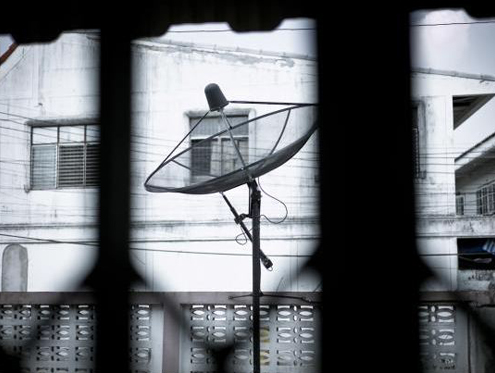A draft Television and Broadcasting Bill was approved by the upper house of parliament on Tuesday, paving the way for private TV broadcasters to operate legally in Burma for the first time.
The bill also sets limits on foreign ownership of private TV broadcasters, establishes a national TV broadcaster, and authorises the creation of a council to regulate the national broadcaster. The TV and Broadcasting Bill is designed to supplement the previously enacted Public Service Media Bill insofar as the national TV broadcaster created under the draft law will be treated as a public service media outlet and therefore governed by the Public Service Media Bill.
DVB spoke with Thaung Su Nyein—a member of Burma’s interim press council and the CEO of a diversified media group which owns 7 Day Daily News Journal—about whether the new Television and Broadcasting Bill will address concerns that the Public Service Media Bill will protect state-run media at the expense of private media companies.
Thaung Su Nyein said, “If the national broadcasting council is independently set up and it doesn’t take instructions or orders from anyone, then I think it has a shot at making public service media truly independent. Otherwise, [it will just be] a branch of the government; regardless of what we call it or how the government tries to frame it as being independent … it’s going to be pretty hard for the chair of the council to say no to the government that appointed him.”
The draft Television and Broadcasting Bill was approved after upper house MPs discussed every clause in the bill—which contains more than 100 clauses—on 14 October. Upper house MP Khin Maung Yi told DVB that the bill’s final version modified a clause which originally said, “Foreigners and foreign organisations are allowed to invest no more than 30 percent in a broadcasting enterprise”. As modified, the final draft now says, “Foreigners and foreign organisations are allowed to make an investment in accordance with existing laws.”
Khin Maung Yi said the term “existing laws” refers to any other relevant laws and is designed to ensure that inconsistencies don’t arise if foreign direct investment (FDI) or other laws are changed at a later date.
“We decided to amend the clause because there could be changes to the permitted ownership ratios under the FDI laws, so the ratio for TV and broadcasting shouldn’t be fixed at 30 percent. Otherwise, we will have to keep amending it to correspond with changes in the FDI laws,” he said.
When asked about foreign ownership of Burmese TV stations, interim press council member Thaung Su Nyein said, “If the law provides for … a minority stake for foreign TV ownership it might actually push for openness and new ways of thinking in the media industry. If the law makes it clear that a foreign media company can invest up to a certain percentage, then I think it’s a welcome change.”
[related]
Burma’s Information Minister Ye Htut told reporters in Naypyidaw that after state-run media outlets are transformed into “Public Service Media” they will get 70 percent of their funding from the government under the Public Service Media Bill, while the remaining 30 percent will come from advertising
Ye Htut said, “The new media laws have been structured this way because in some countries public service media is 100 percent funded by taxpayers. In European countries, everyone who owns a TV has to pay over US$100 in public service media taxes, but in Burma it would be implausible to do so.”
“As such, we are using a system where the government will propose a budget for public service media to parliament for approval. While we can’t disclose exactly how much money will be spent, we will determine whether we can spend it effectively by the end of the year. However, our media laws shouldn’t give either parliament or the government influence over editorials and such,” said the information minister.
The draft Television and Broadcasting Bill says that a “television and broadcasting enterprise” must operate on public funding and be supervised by the public, as the law aims to serve the public. However, such enterprises must be free from political interference and pressure from business groups, said parliamentarian Khin Maung Yi.
A bicameral parliamentary session sent the draft Television and Broadcasting Bill to the upper house for discussion on 26 February. In order to take effect, the bill must also be debated in the lower house and then signed by the president.



